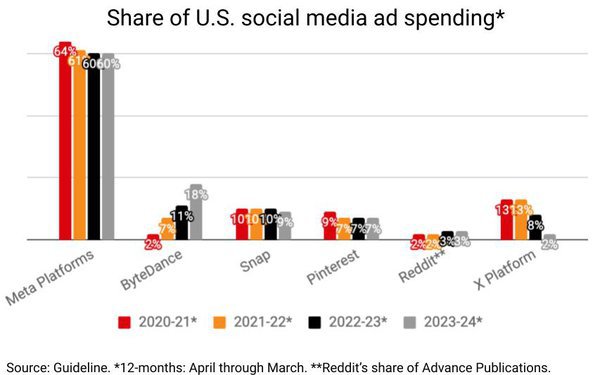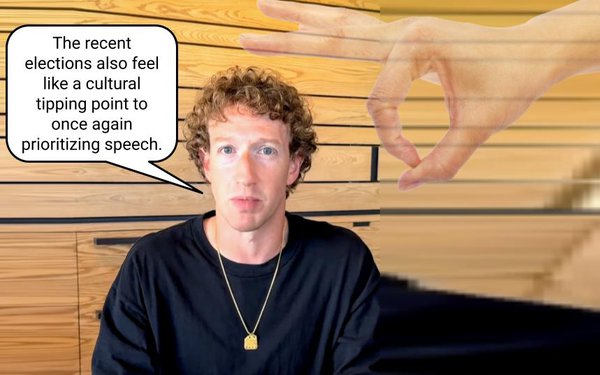
One reason why reactions to Meta's fact-scrapping
move have been so muted in the ad industry is because -- given recent intimidating events -- advertisers and agencies have learned that actions speak louder than words.
And by that, I mean
it's one thing to say you're going to but your money where your mouth is, but it's economically more powerful to just move it in that direction.
Take Twitter -- er, I mean X -- as an
example.
After Elon Musk took control of the platform and began scuttling its content safety and moderation teams there were no massive movements to boycott or form a coalition in response to
those moves.
Big brands simply stopped placing their ads there. And the reason has less to do with free expression, the First Amendment of any politically sensitized debate. It had to do with
the fact that brands simply do not want to show up in unsavory places alongside objectionable content.
advertisement
advertisement
It has been a while since I've seen any explicit data illustrating the impact, but the
last time I published some it came from Guideline (formerly Standard Media Index), and it showed X's share of social media ad spending falling from about 13% of big-brand spending to just 2%, pre- and
post-Musk.
Interestingly, Meta's share also fell a few points during the same period, although I think that has more to do with inherent fragmentation within the social media advertising pie,
including a jump in share going to other platforms, especially TikTok, and not necessarily from big brands "pulling out."
In fact, you may recall what happened with big brands announcing a
very public boycott of Meta's Facebook in response to its questionable content-moderation policies back then: Meta's ad revenue rose, not declined during that period. That's because the reality is
that most of the money spent advertising on Meta's platforms come from small and medium-sized businesses, not the world's biggest brands.
But if history repeats itself, watch for big-brand
spending to decline on Meta's platforms over time due to its content-moderation policy changes, not because of politics, but because the invisible hand of the ad marketplace simply doesn't want to
raise itself in unsafe and unsavory places.
"This will inevitably lead to brands pulling back their engagement and ad spend out of concerns for brand safety amidst content integrity concerns,"
Ammunition Founder-CEO Jeremy Heilpern writes in a post on LinkedIn this
morning, adding: "You don't have to take my word for it, look no further than X since it was privatized and moderation was removed from the platform: ad revenue fell by almost half between 2022
and 2023, decreasing from $4.5 billion to $2.2 billion. This decline is expected to continue, with revenue projections of $2 billion for 2024 and the trend continuing into 2025."
Aside from
being one of the few ad industry execs to publicly comment on Meta's move, Heilpern has a second prediction about the future of -- how shall I say this -- less-than-brand-safe social platforms: they
will increasingly move to premium models to offset declines in advertising revenues.
"Watch for Meta to start selling monthly subscriptions, similar to what X has done for premium features to
offset ad revenue decline," Heilpern predicts.
And we all know how well that's worked for X so far, right?
As someone who has not been an active user on Facebook or Twitter for years
now, I'm not one to talk, but the more toxic a place they become, the more likely people like me will stop showing up altogether.
And if that's something you want to pay for, well, it's a free
country. For now.
